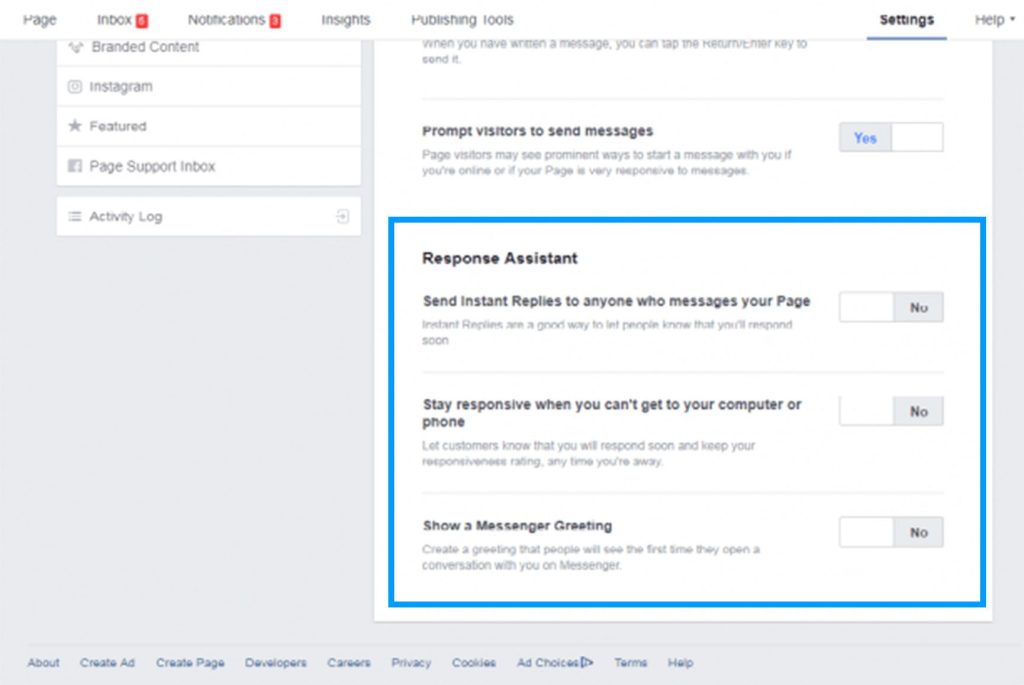Just how sceptical are individuals of advertising? According to a recent survey by Neilson, most digital marketing tools have poor levels of trust outside of websites. This means that, as crucial as your marketing campaigns are for customer acquisition, the majority of consumers will treat them with scepticism. Consumers believe suggestions from individuals they know 91% of the time and customer comments that are posted online 70% of the time. Needless to say, there is a significant difference in how consumers perceive paid online advertising versus suggestions from everyday consumers. What is the reason for this? It’s due to social proof, a psychological phenomenon and as a result, incorporating social proof into your acquisition approach is more vital than ever.
What is social proof?
Much of what makes social proof work is based on psychological principles. Robert Cialdini, a psychologist, coined the term social proof to describe how people react when they are unsure about how to act in a given situation. Rather than relying on their own experience or intuition, they seek advice from others on what they should do. For example, when someone is unsure how to act in a social situation they may not have encountered before, they take guidance from the people around them. If someone is attending a gala for the first time, it is natural for them to observe their surroundings to make sure they are fitting in and acting the way everyone expects them to act. Looking at what others are doing as a guide for what we should do ourselves is a natural and comfortable response. Furthermore, while we respect the opinions of those who appear to be like us, the more people who share a specific attitude, the stronger the social proof gets. In some ways, social proof appears to our desire to be accepted. We want to make decisions that will also be accepted by our peers. This is true not only in terms of how we act in public but also in terms of what we buy. Some sources of social proof, such as customer reviews and testimonials, or referrals from friends, are undoubtedly already recognisable to you. However, there are at least six different types of social proof:
Expert social proof
When an expert in your industry supports your products or services or is affiliated with your brand, this is known as expert social proof. A Twitter shout out from an expert or having an expert on your Twitter chat are two examples.
The crowds’ knowledge
This type of proof is when a large number of people appear to be endorsing your brand. For example, having tens of thousands of customers or millions of followers on your social media platforms.
Customer/User social proof
When current users suggest your products and services based on their interactions with your brand, this is known as user social proof. Praise through social media, for example, or nice reviews on review websites.
The wisdom of your friends
This type of social proof is when a large group of people see that their friends approve of your goods. Seeing their friends use your products or following you on social media are two examples.
Celebrity social proof
Celebrity social proof is when a celebrity recommends your products. An Instagram post or a tweet about your product from a celebrity or influencer, for example.
Certification
This sort of social proof occurs when an influential individual in your sector gives you their seal of approval. For example, the blue verification tick on Twitter or Facebook or a secure payment trust badge on your website.
Why is social proof important for business?
Why do you need to use social proof in your marketing now that you know what it is? Why is it an important part of your business strategy? Consider these stats:
- Friends and family recommendations account for 40% of consumers discovering new brands to follow online.
- 91% of shoppers examine online reviews before making a purchase.
- Before making any form of purchase, 82% of people seek referrals and recommendations from family and friends.
So, in a nutshell, a shopper’s purchasing decision is heavily influenced by social proof. When considering a purchase or deciding between two brands, customers often seek advice from others who have used the products before. And customers aren’t fussy about who they listen to. It could be a member of the family, a friend, an idol, or even a celebrity. We are influenced by social proof in a variety of ways, and we seek to others for guidance on how to pay in restaurants when travelling and what to do in an emergency, to mention a few things. Because social proof is such an important aspect of everyday living, buyers on your website may feel alienated if your business lacks it. Incorporating social proof into your marketing strategy is beneficial to your business.
How to generate social proof
Long before it was a trending term, businesses used social proof to advertise their products and services. The use of language like “four out of five dentists recommend…” in ad campaigns was a clear attempt to use social proof. When it comes to purchasing a new product or service, customers nowadays are more likely to seek advice from their peers. In today’s increasingly digital environment, this includes browsing for suggestions on Google, Facebook, Yelp, and other sites. BrightLocal claims that reviews have become so critical to the buying process. When researching local businesses, 82% of consumers use internet reviews, with the typical person reading 10 reviews before deciding whether or not to trust a business. While most customers regard reviews as a reliable source of information, others will refuse to leave one unless you ask them to. The graph below shows what proportion of consumers have ever written an online review for a local business.
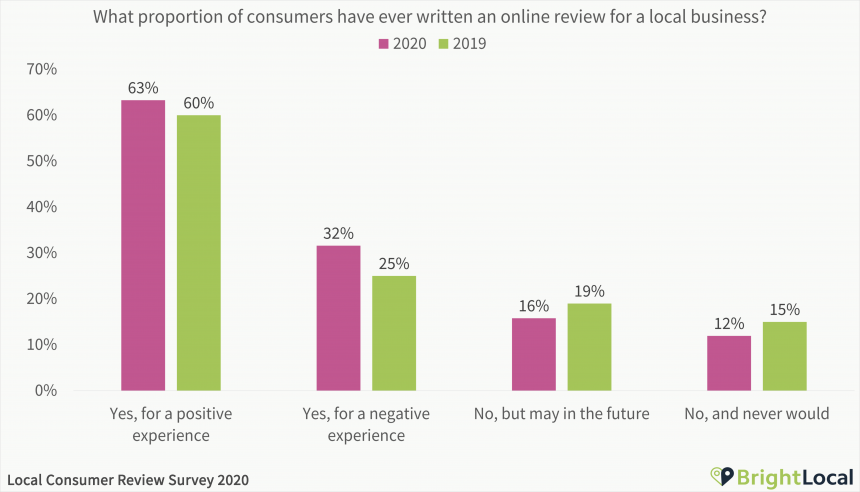 Image Source| Local Consumer Review Survey 2020 by BrightLocal.
Image Source| Local Consumer Review Survey 2020 by BrightLocal.
If you are worried about annoying your customers by asking for reviews, this doesn’t have to be a concern. If your customers have had a positive experience with your business, they will be eager to write a review. Simply put, all you have to do is ask.
Examples of social proof to help improve your digital marketing
You may use social proof in your marketing in a variety of ways to show off your happy customers to future clients. One of the most effective marketing strategies is to know that individuals have previously expressed satisfaction with your business and its products or services.
Invite professionals to manage your social media accounts
Having industry experts manage your social media accounts can be a terrific way to capitalise on their influence and the positive associations that followers have with whatever they do (e.g., halo effect). When an expert takes over your Instagram account to post instructional content, tell Instagram Stories, or go live, for example, people who know them are more likely to like your business since their presence on social media has a good impact on them. The best aspect about such collaborations is that they are frequently a win-win situation since industry experts gain access to your audience as well.
Curate user-generated content (UGC)
User-generated content is a force to be reckoned with when it comes to social proof-driven conversions. UGC positions your business as a people-focused, community-oriented brand, demonstrating to future clients that your current customers have purchased from you and are happy with it. This is very likely to inspire new clients to make more purchases. Users on the internet will see how others are enjoying and profiting from your products and services, and they will follow suit. Having a dedicated highlight or section for UGC is a fantastic approach to showcase your customers and their devotion to future customers.
Example:
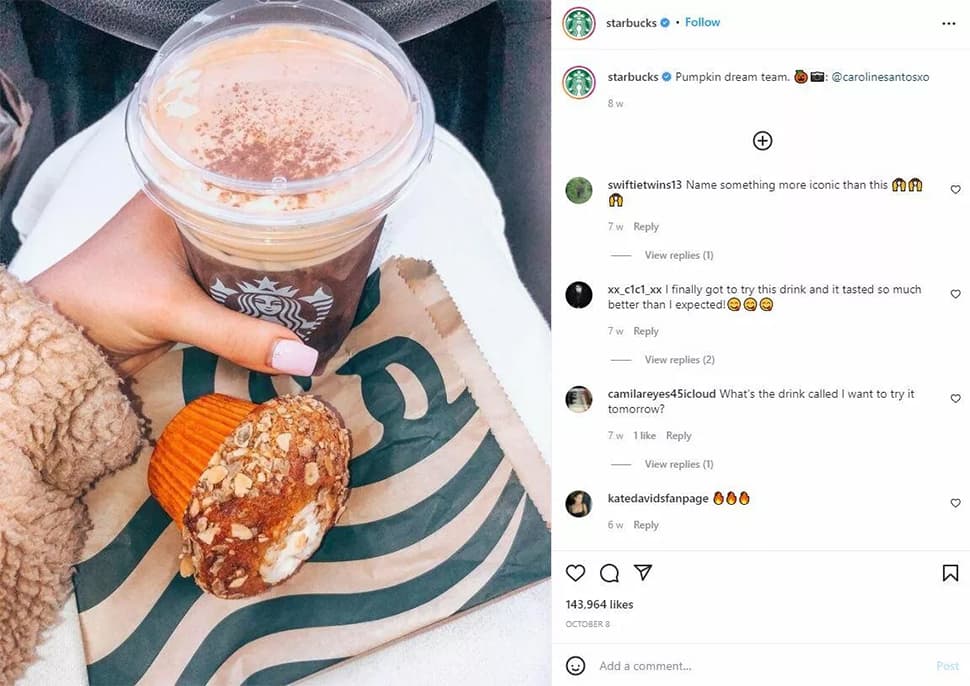
Collaborate with experts for a social media event
Similarly, for social media events such as Twitter chats or Facebook Live video conversations, you may invite experts as guests. Collaborations like these can help you tap into the experts’ positive influence while also allowing your social media viewers to hear and learn from industry professionals.
Awards and trust badges
Demonstrate your credentials by plastering them all over the place. Declare every award, nomination, qualification, and certification you have ever received on social media, display your badges on your website, and tweet about it. You may improve your brand’s reputation by associating it with reliable, respected bodies, and it is also a terrific method to get SEO-rich links from your website.
Example:

Share statistics, achievements, and milestones
Showing thanks for your user or following accomplishments is another fast method to establish social proof. If you have 100k followers, have received an award, made over 1000 sales, fifty 5* ratings, have sold over 500 homes, or have donated £2,000 to charity for an event, shout about it! Using numbers, percentages, and statistics to strengthen and enrich your argument – numbers are data, and data is verifiable evidence. You may even provide numerical numbers, such as the numbers of branches or products you have. All of these are facts about your business and its progress that can be readily incorporated into your social media posts and bios. Here are a few more milestones you can celebrate with your audience:
- Reaching X users.
- Reaching X customers.
- Reaching X downloads of your app.
- Reaching X followers on your social media accounts.
- Anniversaries.
Experiment with influencer marketing
Influencer marketing can be a cost-efficient way of getting celebrity social proof. Working with influencers in your field can help you gain new customers and followers. Users follow influencers because they want to see the products they share and love, and they trust and want to emulate the ones they follow. 40% of people claim they have purchased a product online after seeing it used by an influencer on social media. These individuals are frequently regarded as celebrities within the niche sector due to their social media influence. When others see them with a particular product, they would transfer the positive attributes they see in these celebrities to the product.
Example:
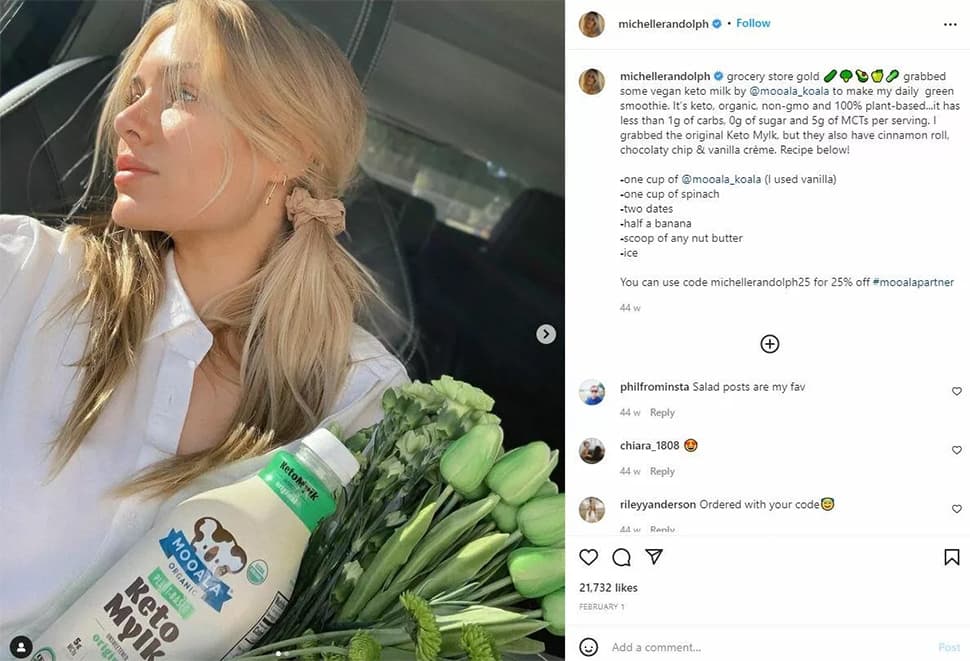
PR and media attention
Share and promote any PR or media attention you obtain. On your website, provide an as seen in section as well as your social media highlights. Connect with news outlets and online content creators in your industry to get media coverage from credible businesses that you may share. If you can get your business mentioned in news outlets that your target demographic reads, you’ll be able to expand your social media following.
Reviews and testimonials
Turn your positive business mentions and tags into visual content for social media and share your good reviews and testimonials. When it comes to marketing your brand, reviews are the cornerstone for generating social proof. Make sure you respond to all of them, including the ones that are negative. If you can respond to unfavourable reviews with a constructive answer, you will demonstrate to your online audience that you are customer-centric and genuine – after all, no one is perfect.
Example:
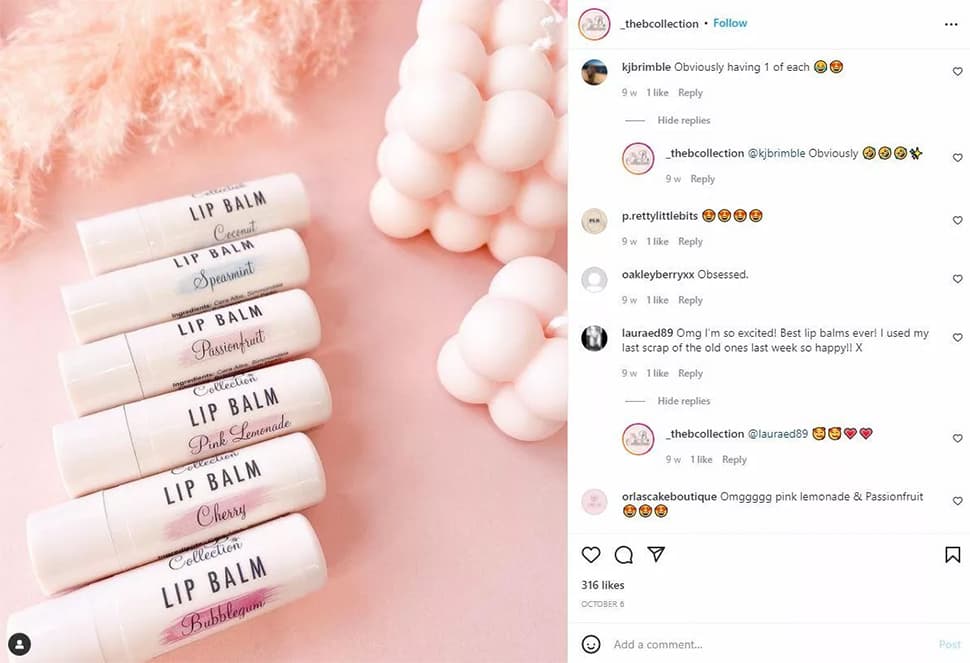
Explore having brand ambassadors
Depending on the ambassadors you choose, social media ambassadors can provide a mix of expert, celebrity, and user social proof. They could be industry experts (expert social evidence), celebrities (celebrity social proof), or enthusiastic users (user social proof). Ambassadors typically wear their ambassador badge proudly on their social media bios and use any branded hashtag in relevant social media posts. If your social media ambassadors can demonstrate the quality of your products and services to others, they will bring you additional leads, followers, and customers.
Mention the size of your customer base in your bio
You could include the size of your customer base in your profile bio if you have a significant customer base. It is a superb example of social proof based on the crowd’s knowledge. People are more likely to have favourable first impressions of your products if they notice that many others are utilising them. Aside from the size of your consumer base, here are some stats you could mention:
- The location of your business services or your customers are in (e.g., in London).
- Number of recommendations given (e.g., more than 100 5* ratings on Yelp).
Example:
 Image Source
Image Source
Reach the friends of your Facebook page admirers with Facebook ads
If you have the cash for social ads, try targeting your Facebook ads at the friends of people who like your page. This assumes that this target group is similar to your current Facebook Page admirers and would be interested in the things you offer. Scroll down to Connections and select Add a connection type when creating your target audience in Facebook Ads Manager. Then go to Facebook Pages > Friends of people who like your page and type your pages name into the box.
Get verified
You can get verified on Twitter, Facebook, and Instagram and obtain a blue tick in your bio. A blue tick next to your bio is a type of social proof certification. As an authority figure, the social media network determined that you are popular, influential, or fascinating enough to receive the tick, which is normally reserved for celebrities and big corporations. You would receive access to additional features reserved for verified users or pages alone, in addition to garnering trust and respect from the community. If you wish to get the blue tick on social media, here is our guide to getting your social media accounts verified.
Example:

Host Twitter chats
Trending on Twitter is another sort of social proof based on the wisdom of the community. When your hashtag becomes popular on Twitter, it may entice people to learn more about it and even participate in the conversation. Hosting Twitter conversations is one of the most effective strategies we’ve found to trend on Twitter. By trending on Twitter, you will be able to reach a wider audience and some of them may be interested enough to check out (and possibly use) your products. Here is more on Twitter trends, including Twitter’s trending guidelines. The good news is that Twitter trends are decided by an algorithm and are automatically modified for individuals based on who they follow, their hobbies, and their location. This means you won’t have to compete with people from all over the world to get your content to trend on your target audience’s feed.
Be responsive
You can opt to declare how responsive you are on Messenger on your Facebook page. If you offer customer service on Twitter, you can specify the hours when you are most available. It can inspire individuals to message you because they know they’ll get a response immediately. For Facebook, here is how you do it:
- Go to your Facebook Page’s settings and click the Messaging tab. Choose the response time that best depicts how quickly you respond to messages by scrolling down to Response Assistant. You may also set it to automatically update.
Example: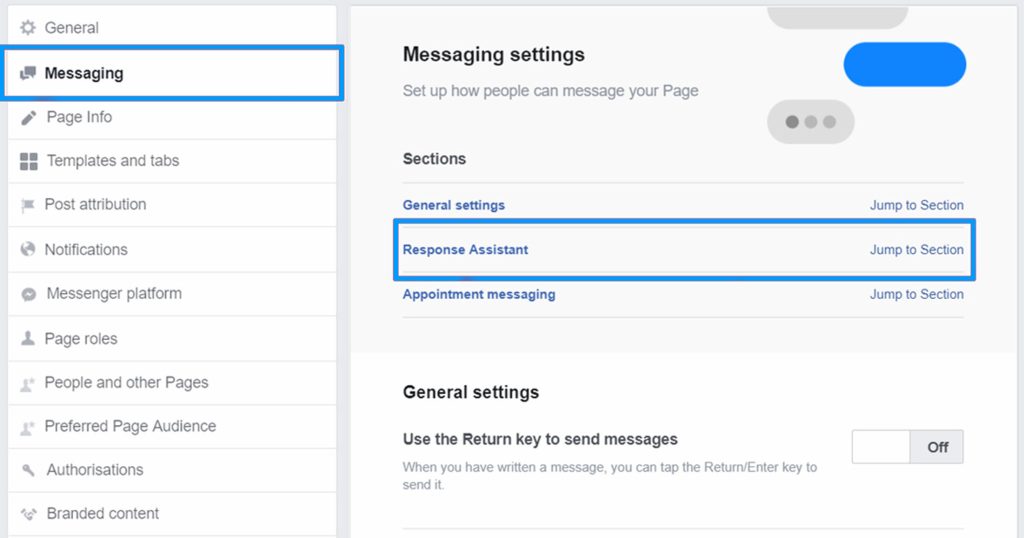 Image Source
Image Source
Off-page SEO and mentions
Not only can linking your website or social media profiles and having your business featured on your off-page websites improve your SEO, but it also gives your business greater credibility, a bigger reach, and more avenues for potential clients to find you. Collaborate with other businesses, recommend each other online and on social media, and link to each other’s websites for a quick win.
Social proof can occur in a variety of forms. Start using social proof in your marketing strategy today by learning how to incorporate these types of social proof into your own marketing. These 15 ideas will both get you started with leveraging social proof in your marketing and inspire you to come up with new ones.
Related reading:
What is Social Listening?

